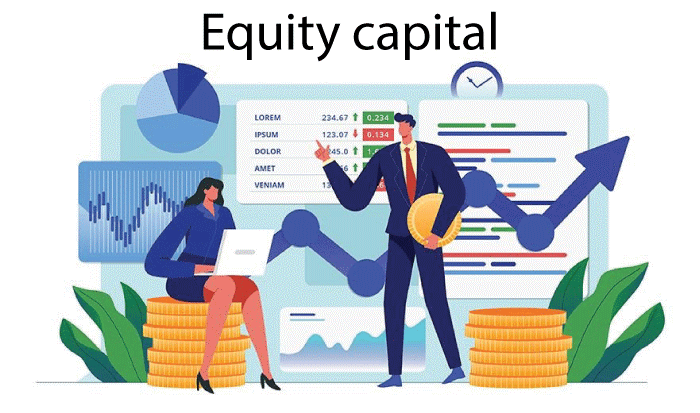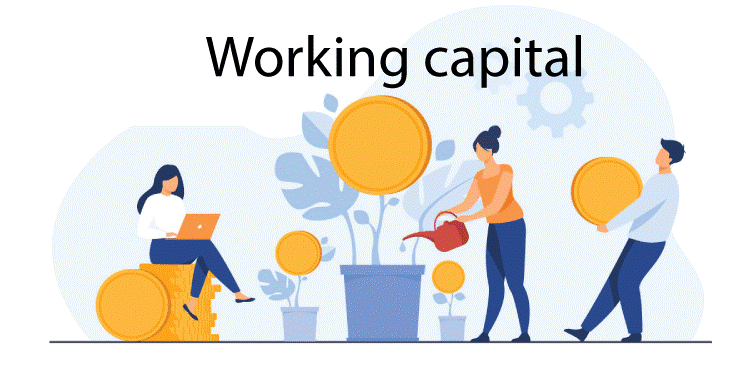Capital DefinitionWhat Is Capital?Capital is a broad term used to refer to anything that provides benefits or value to the owners of it, like factories and their machinery, intellectual property, such as patents, or finances of a corporation and individual. While money may be thought of as Capital, it is typically related to cash that is utilized for investment goals. Capital is generally vital to managing a business from day to day and funding the future growth of the business. The business capital can come from the operation of the company or obtain through equity or debt financing. The most common sources of Capital are:
Understanding CapitalFrom an economist's perspective, Capital is the most important factor in the success of every unit, regardless of whether it is a family unit, an individual business, a big corporation or an entire economy. Capital assets can be located in either the current or long-term section of the balance sheet. These assets could comprise cash, cash equivalents and marketable securities, production facilities, manufacturing equipment and storage facilities. Capital is usually liquid or cash assets being stored or accessed for spending. In a broad sense, the term could be broadened to encompass the entirety of assets owned by a business with monetary value, like real estate, equipment, and inventory. However, when it is time to budget, the term capital is the cash flow. Capital can generally be considered a measure of wealth as well as a source of increasing wealth via direct investment or capital project investment. Individuals have Capital and capital assets as a part of the wealth they have. The capital structure of companies includes equity capital, debt capital and working Capital for everyday expenses. How companies and individuals finance their working Capital, as well as the way they invest this Capital, is crucial to their success. How Capital Is Used?Companies use Capital to fund the continual production of products and services that generate profits. Businesses use Capital in order to fund a variety of things in order to create value. Building expansions and labour are two of the most common areas for capital allocation. When placing Capital into the market, a company or an individual aims to earn more than the costs of Capital. On the global and national levels, financial Capital is scrutinized by economists in order to determine the ways it influences the growth of the economy. Economists study a variety of indicators of Capital, such as personal consumption and income, through the Commerce Department's Personal income and Outlays reports. Capital investment can also be seen in the quarterly report on Gross Domestic Product. Typically, business capital, as well as financial Capital, are evaluated by the business's capital structure. For instance, in the U.S., banks are required to maintain an amount of Capital in order to satisfy an obligation to reduce risk (sometimes called economic Capital) in accordance with central banks and bank regulations. Private companies also are accountable for evaluating their thresholds for Capital, capital assets and capital requirements to fund corporate investments. A majority of the business analysis of financial Capital is performed by studying the balance sheet. Capital and Money:The money we use is not Capital. Money is currency notes and coins that are circulated or minted by the government. Capital includes all that wealth, such as machinery, tools and buildings that are referred to by the term capital goods. So, all money in the world isn't Capital. Only the portion of the money that is utilized for the creation of additional income is termed Capital. Capital and Wealth:There is a distinction between wealth and Capital. Only that portion of wealth used to further produce is referred to as Capital. Thus, every capital asset is wealth, but all wealth isn't Capital. The chairs and cots in homes are considered to be wealth; however, if they are provided on a lease, they are referred to as Capital. Capital and Land:As with the land, Capital is an important element of production; however, there is a distinction between land and Capital. Capital is created by humans. It is produced by man through specific efforts. The land is a gift from nature. The human being is unable to produce land. Production methods can be used to increase the Capital's supply, but not the supply of land. The land is not mobile, but Capital is mobile due to the fact that its supply can easily be modified. Capital and Income:There is a significant distinction between income and Capital. Capital is part of the wealth that is utilized for the further generation of income. So income is the result of the utilization of Capital. Capital is, therefore, a capital stock, while income is a flow produced from Capital. Real Capital and Financial Capital:Capital, also known as national Capital, is the amount of production of goods, such as raw materials, machines, factories, railways, houses, boats, buses and more, that are used in the production of services and goods. It refers to human-made and reproducible resources that assist in producing output and earning money. Financial Capital is comprised of all financial assets that generate income, such as money bonds, stocks, mortgages, deeds etc. These are assets of personal wealth. They are a rightful claim to others. Similar to when it comes to bank deposits. The rupees we use or keep in our accounts form an element of the wealth we have built up in our lives. They are a claim on items and services, like when it comes to bonds and stocks. They are considered to be financial Capital, not real Capital. Because financial Capital is a right to assets, but it doesn't generate income or output. Types of CapitalBelow are the top four kinds of Capital that companies focus on in great detail. 1. Debt Capital
A company can get Capital through borrowing. This is referred to as debt capital, and it is available via government or private sources. For established businesses, typically, this means borrowing from banks as well as other financial institutions or issuing bonds. For smaller businesses with a tight budget, sources of Capital could include family and friends as well as businesses that issue credit cards and federal loan programs. As with individuals, businesses need to have a credit history that is active in order to be able to access debt capital. The repayment of debt capital requires regular payment with interest. The rates of interest vary based on the kind of Capital financed and the credit history of the borrower. People see the burden of debt as an inconvenience, but companies consider it an opportunity, at least if the debt doesn't get out of hand. This is the only way companies can get a substantial lump sum of money to make a significant investment in the near future. However, both the business and potential investors should be aware of the ratio of debt to Capital to ensure that they don't get too deep. Bonds are a popular method used by corporations to raise Capital for debt, in particular when rates of interest are low, which makes it more affordable to take loans. In the year 2020, for instance, the number of corporate bonds issued by U.S. companies soared 70 percent year-over-year, as per Moody's Analytics. Average yields on corporate bonds reached a multi-year low of about 2.3 %. 2. Equity Capital
Equity capital can take different forms. In general, there are distinctions drawn between public equity, private equity and property equity. Public and private equity is usually structured in the form of shares of stock held by the company. The only difference can be seen in the way that public equity gets raised through listing the shares of the company in a market, whereas private equity is sourced from a closed investor's group. If an investor purchases shares in a stock market, they are supplying equity capital to a business. The most dramatic events in the business of raising funds occur naturally when companies launch their Initial public offering (IPO). In 2021, it was the year that Duolingo IPO valued the company at $5 million. It also caused a stir in markets like the Nasdaq market. 3. Working Capital
Working Capital in a business is the liquid capital assets which are available to fulfill everyday obligations. It is determined using the following two assessments: Current Assets - Current Liabilities Accounts Receivable + Inventory - Accounts Payable Working Capital refers to a company's short-term liquidity. In particular, it is the capacity to cover accounts payable, debts and other obligations due in the next year. It is important to note that working Capital can be defined as the current assets less the current liabilities. If a company has more debt than assets, it may soon have insufficient working Capital. 4. Trading Capital
Each business requires a large amount of Capital to function and earn profit. Balance sheet analysis is the key to the evaluation and analysis of the business's Capital. The term "trading capital" is employed by brokerages and other financial institutions that execute numerous transactions each day. Trading capital refers to what is the sum of cash that is allocated either to an individual or company to purchase and trade various securities. Investors can try to add to their trading capital by applying a variety of optimization strategies. These strategies aim to maximize the investment by determining the optimal amount of money to invest in each trade. To be successful, investors need to establish the ideal reserve of cash needed for their investment strategies. Large brokerage companies such as Charles Schwab or Fidelity Investments will allocate considerable trading capital to the experts who trade stocks and other assets for it. Characteristics of Capital1. Man Produces Capital:Capital is wealth that is utilized in the creation of products. It is the product of human effort. Therefore, all kinds of Capital, like roads, machines, buildings and factories, etc., are made by human beings. It is a produced factor of production. 2. Capital is a Passive Factor of Production:Capital cannot be created without the labour's active assistance. For machines to produce, labour is needed. Therefore, labour is an active factor, while Capital acts as an inactive element of production. Capital itself is unable to produce anything until the labour force is applied to it. 3. Capital is a Produced Means of Production:The process of composing or supplying Capital is not automatic. It is made possible by the combined efforts of land and labour. Capital is, therefore, the result of a production process. 4. Capital is Variable:The land supply is not able to be altered, but the Capital supply can be adjusted to increase or decrease. If the people of a nation are able to produce more or save more from their earnings, and these savings are put into production facilities, and capital goods, this will increase the amount of Capital available. 5. Capital is more mobile than other factors of production:Out of all the components of production, Capital is one of the most flexible ones. The land is completely immobile. Entrepreneurs and workers are also not mobile. Capital is easily moved from one location to another. 6. Capital Depreciates:As we continue to utilize Capital, its value continues to depreciate. If machines are utilized continuously for a period of time, they decrease in value and depreciate. 7. Capital is Stored-up Labour:The scholars like Marx acknowledge that Capital is stored-up labour. Through his work, man can earn money. Some of the money is used to purchase items of consumption, and the remaining portion is saved. When savings are invested, they are transformed into Capital. Also, Capital is the result of the accumulation of man's savings. So, Capital is essentially stored labour. 8. Capital is Destructible:Capital goods are all non-permanent and destructible. Due to the constant use of machines and tools, they tend to become useless with time.
Next TopicCataracts Definition
|
 For Videos Join Our Youtube Channel: Join Now
For Videos Join Our Youtube Channel: Join Now
Feedback
- Send your Feedback to [email protected]
Help Others, Please Share










